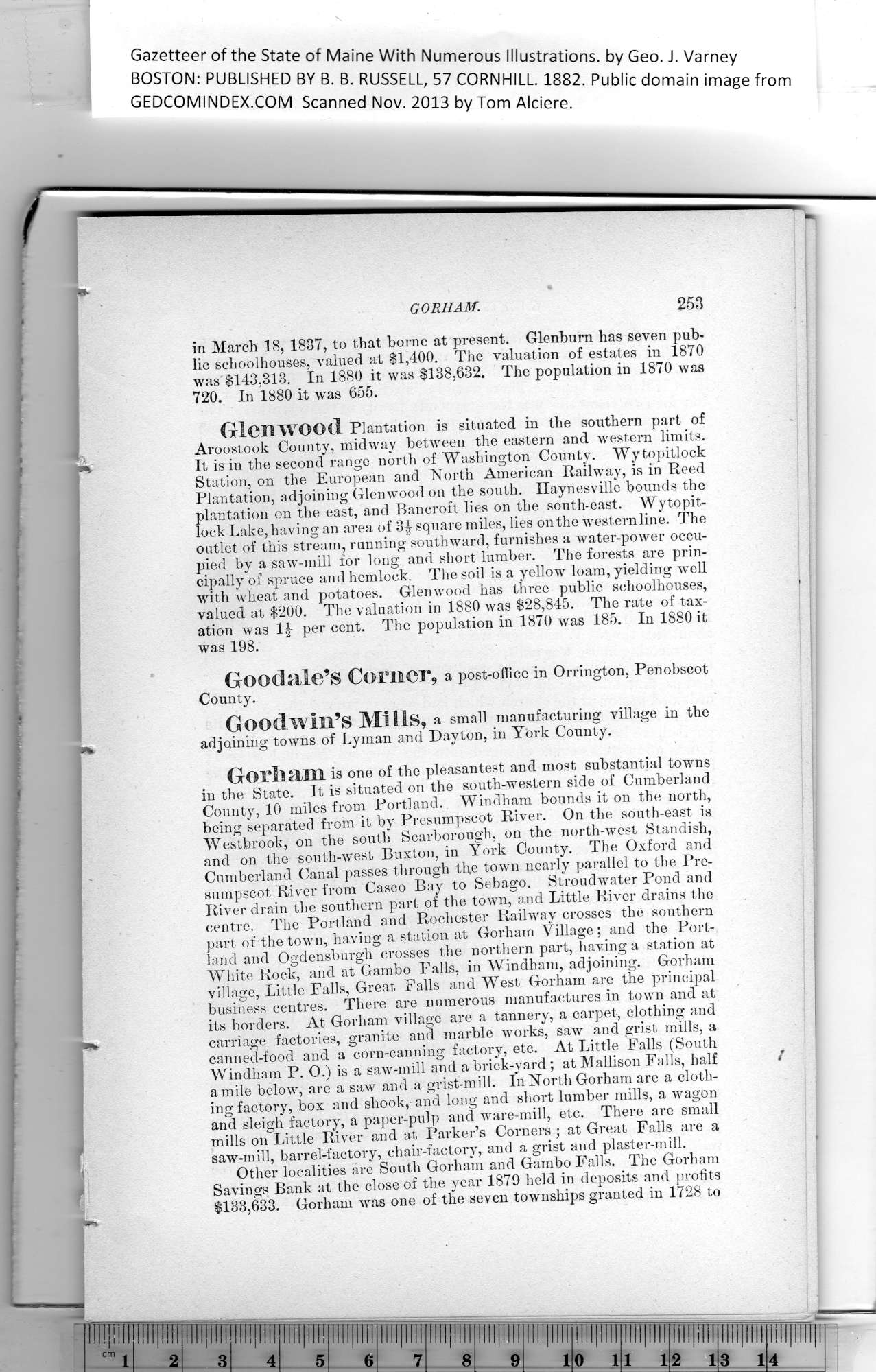|
GORHAM.
in March 18, 1837, to that borne at present. Glenburn has seven pub-
lic schoolhouses, valued at $1,400. The valuation of estates in 1870
was $143,313. In 1880 it was $138,632. The population in 1870 was
720. In 1880 it was 655.
Glenwood Plantation is situated in the southern part of
Aroostook County, midway between the eastern and western limits.
It is in the second range north of Washington County. Wytopitlock
Station, on the European and North American Railway, is in Reed
Plantation, adjoining Glenwood on the south. Haynesville bounds the
plantation on tbe east, and Bancroft lies on tbe south-east. Wytopit-
lock Lake, having an area of 3^- square miles, lies on the western line. The
outlet of this stream, running southward, furnishes a water-power occu-
pied by a saw-mill for long and short lumber. The forests are prin-
cipally of spruce and hemlock. The soil is a yellow loam, yielding well
with wheat and potatoes. Glenwood has three public schoolhouses,
valued at $200. The valuation in 1880 was $28,845. The rate of tax-
ation was 1|- per cent. The population in 1870 was 185. In 1880 it
was 198.
Goodale’s Corner, a post-office in Orrington, Penobscot
County.
Goodwin’s Mills, a small manufacturing village in the
adjoining towns of Lyman and Dayton, in York County.
Gorham is one of the pleasantest and most substantial towns
in the State. It is situated on the south-western side of Cumberland
County, 10 miles from Portland. Windham bounds it on the north,
being separated from it by Presumpscot River. On the south-east is
Westbrook, on the south Scarborough, on the north-west Standish,
and on the south-west Buxton, in York County. The Oxford and
Cumberland Canal passes through the town nearly parallel to the Pre-
sumpscot River from Casco Bay to Sebago. Stroudwater Pond and
River drain the southern part of the town, and Little River drains the
centre. The Portland and Rochester Railway crosses the southern
part of the town, having a station at Gorham Village ; and the Port-
land and Ogdensburgh crosses the northern part, having a station at
White Rock, and at Gambo Falls, in Windham, adjoining. Gorham
village, Little Falls, Great Falls and West Gorham are the principal
business centres. There are numerous manufactures in town and at
its borders. At Gorham village are a tannery, a carpet, clothing and
carriage factories, granite and marble works, saw and grist mills, a
canned-food and a corn-canning factory, etc. At Little Falls (South
Windham P. O.) is a saw-mili and a brick-yard; at Mallison Falls, half
a mile below, are a saw and a grist-mill. In North Gorham are a cloth-
ing factory, box and shook, and long and short lumber mills, a wagon
and sleigh factory, a paper-pulp and ware-mill, etc. There are small
mills on Little River and at Parker’s Corners ; at Great Falls are a
saw-mill, barrel-factory, chair-factory, and a grist and plaster-mill.
Other localities are South Gorham and Gambo Falls. The Gorham
Savings Bank at the close of the year 1879 held in deposits and profits
$133,633. Gorham was one of the seven townships granted in 1728 to
PREVIOUS PAGE ... NEXT PAGE
This page was written in HTML using a program written in Python 3.2
|
